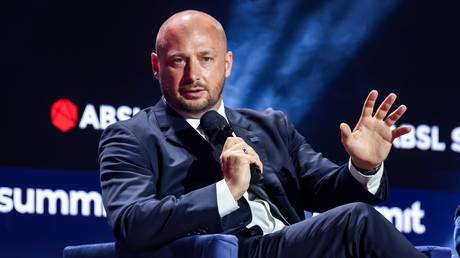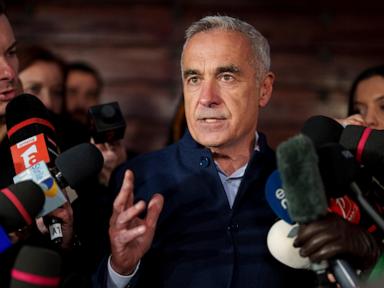ARTICLE AD BOX
THE SUDDEN death of Iranian president Ebrahim Raisi will “absolutely” lead to an increase in executions of dissenters, experts have warned.
Iran’s supreme leader Ayatollah Ali Khamenei is also feared to be ramping up efforts to get his hands on a nuclear bomb.
 AP
AP Tasnim Military
Tasnim Military Iran’s ‘morality police’ detain and arrest a woman for not wearing a headscarfCEN
Iran’s ‘morality police’ detain and arrest a woman for not wearing a headscarfCEN AP
AP
Kremlin propagandists have rushed to blame the West for Sunday’s helicopter crash which killed President Raisi, 63, and Foreign Minister Hossein Amirabdollahian, 60.
Their bodies and that of several other officials were discovered today among the wreckage of a US-made Bell 212 helicopter, following a gruelling overnight search in blizzard conditions.
Supreme Leader Khamenei has scrambled to assure Iran will carry on as normal and confirmed First Vice President Mohammad Mokhber as interim head of the country’s executive branch.
Mokhbar was part of a team of Iranian officials who visited Moscow in October and agreed to supply surface-to-surface missiles and more drones to Russia‘s military, sources told Reuters last year.
Khamenei said on Monday: “I announce five days of public mourning and express my condolences to the dear people of Iran,” adding that Mokhbar had up to 50 days to organise a new presidential election.
Hossein Abedini, the deputy representative of the National Council of Resistance of Iran (NCRI) in the UK, warned Khamenei is likely to go to extreme measures to maintain control of his country – as anti-regime Iranians launch fireworks and dance in celebration of Raisi’s demise.
Mr Abedini told The Sun: “To stay in power, Khamenei will absolutely increase atrocities and execution of its own people to contain the dissent inside the country.
“It will also intensify its terrorist activities in the Middle East through IRGC, Hezbollah and the Houthis.”
He added that Khamenei will adopt a “very aggressive policy” to try and keep his dictatorship in power.
Mr Abedini explained: “The regime will escalate its two-fold tactic of silencing the public at home with repressive measures while waging war outside the country.
“It will also try to acquire a nuclear bomb now more than ever.
“Terrorism has been the main pillar of Iran and to maintain his theocratic position, Khamenei will go more brutal and all the factions of his regime – the IRGC, Hezbollah and the Houthis – are all united and committed to more warmongering.”
Tyrannical Raisi, known by some as “The Butcher”, was travelling in a convoy of three helicopters in Iran’s East Azerbaijan province when his own aircraft suffered a “hard landing”.
The cause of the deadly crash had not been confirmed by Monday afternoon, though initial reports pointed to poor weather conditions.
Moscow, on Vladimir Putin‘s orders, sent an emergency rescue team to assist with the search for Raisi after he was realised to be missing on Sunday – but they arrived too late.
The bodies of Raisi and the other killed officials will be transferred to the city of Qom ahead of a funeral ceremony in Tabriz on Tuesday.
Kasra Aarabi, director of Islamic Revolutionary Guard Corps (IRGC) at United Against Nuclear Iran, warned that “elite chaos” is inevitable with the regime now in “full panic mode”.
He told The Sun: “Khamenei will be extremely concerned about this, empowering the most ideological absolutists across the board.
“Now the regime will be fully aware of this, so expect in the next 24 to 48 hours heavily securitised presence on the streets. Even more securitised than before.”
Putin is currently dependent on Iran for supplies of kamikaze drones and missiles for his ongoing war against Ukraine.
To stay in power, Khamenei will absolutely increase atrocities and execution of its own people to contain the dissent inside the country
Hossein AbediniThe tyrant’s propagandists have blamed the West and Israel for the crash, with Russian war correspondent Semyon Pegov even claiming there was a “London trace” to the mangled chopper.
He said: “When I talk about a possible Israeli trace, this does not mean that there is no British, American or Turkish one.
“Israel was both an interested party and had the technical ability to carry out this terrorist attack.
“But I don’t think that Tel Aviv would have taken such a radical step without consulting and informing senior comrades from the Nato bloc.”
And Sergey Kolyasnikov, the author of pro-war Telegram channel Zergulio, claimed: “The USA and Great Britain continue to behave like punks who are not rebuffed and, as a result, are losing their shores.
“Both in foreign policy and in the confrontation with Russia, where the West is not doing so well – they have moved on to radical measures.”
He continued: “If Israel can kill Iranian generals in the Iranian embassy in Syria, and the United States can kill IRGC General Qassem Soleimani in Iraq, then why can’t they kill intractable prime ministers and presidents? After all, everything is allowed.”
The Russian blogger said that “pro-Russian and pro-Chinese politicians in the West should double their caution and security”.
Who was Ebrahim Raisi?

IRAN’S hardline president Ebrahim Raisi has a bloody history steeped in murder and helped oversee the mass executions of thousands.
The 63-year-old had positioned himself as a potential successor to Supreme Leader Ayatollah Ali Khamenei – before he died suddenly in a helicopter crash on Sunday.
Known by some as The Butcher, Raisi won a landslide victory and was declared Iran’s president in 2021.
The brute is alleged to have been a key member of the so-called “Death Commission” which ordered thousands of political prisoners to be killed in 1988, as Iran‘s eight-year war with Iraq came to an end.
His alleged role was said to be pivotal in winning him the support of powerful Iranian theocratic rulers.
The US sanctioned Raisi in 2019 for his “administrative oversight” of the executions of juvenile offenders, and for the torture and “amputations” inflicted on prisoners in Iran – as well as for the 1988 mass executions.
Raisi later led the country as it enriched uranium near weapons-grade levels, and was in power when Iran launched a massive drone and missile attack on Israel in April.
The president allegedly ordered the torture of pregnant women, had prisoners thrown off cliffs, had people flogged with electric cords, and oversaw countless other brutal acts of violence.
Mass protests swept Iran in 2022 after the death of Mahsa Amini, a woman who had been detained over allegedly not wearing a hijab, or headscarf, as was required by authorities.
Following the demonstrations, a monthslong security crackdown saw more than 500 people killed and more than 22,000 others detained.
In March, a United Nations investigative panel found that Iran was responsible for the physical violence that led to Amini’s death.
Iran’s former foreign minister, Mohammad Javad Zarif, was quick to blame the US for the crash – without providing any evidence.
Israel hit back at speculation it may have been involved, with an unnamed Israeli official telling Reuters: “It wasn’t us.”
Palestinian militant group Hamas expressed sympathy to the Iranian people for the “immense loss” of their president.
And Lebanon‘s Iran-backed Hezbollah group and the Houthi rebels in Yemen both issued statements praising Raisi and mourning his death.
Iran has supported armed groups in Lebanon, Syria, Iraq, Yemen, and the Palestinian territories for decades.
But tensions have never been higher since Iran, under Raisi, launched a massive drone and missile attack on Israel last month in response to an airstrike on an Iranian consulate in Syria.
Ultranationalist pro-Putin politician Lenin Slutsky said “the cause – weather conditions or criminal intent – will be investigated”.
As interim president, Mokhber is part of a three-person council that must organise a new presidential election within 50 days of Raisi’s death.
Ali Ansari, a professor of Iranian studies and a member of think tank RUSI, warned that there will be “a lot of jockeying” for power.
He told The Sun: “I think people are going to be watching very carefully as the system basically eats itself up alive.”
 Reuters
Reuters AFP
AFP Reuters
Reuters The site of the helicopter crash that killed Iranian president Raisi on Sunday
The site of the helicopter crash that killed Iranian president Raisi on Sunday SNN
SNN President Raisi is pictured on board the helicopter before his death
President Raisi is pictured on board the helicopter before his death.png)
 6 months ago
4
6 months ago
4








 English (US)
English (US)